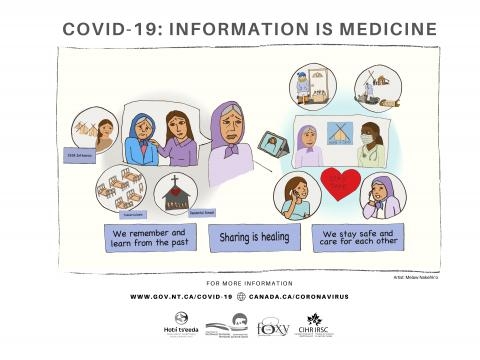
As part of the Our Home is Our Camp campaign (#homeiscamp), Hotıì ts'eeda, FOXY (Fostering Open eXpression among Youth) and the Government of the Northwest Territories (GNWT) Department of Health and Social Services have collaborated to develop new resources that bring attention to the ongoing impact of past epidemics and disease outbreaks on the Indigenous peoples of the NWT as a way to improve health outcomes during the COVID-19 pandemic.
“It is important to recognize and understand that there are people among us who lived through past epidemics or whose families were devastated by them,” said Hotıì ts'eeda Chairperson John B. Zoe. “If we listen to these stories and understand how they affected people, it will help us do a better job of stopping the spread and staying safe.”
The poster titled “COVID-19: Information is medicine” uses artwork by Dehcho Dene artist Melaw Nakehk’o to create a dialogue about how past epidemics and disease continue to impact the Indigenous peoples of the NWT.
“The current public health measures can feel very similar to things that have happened to Indigenous people or their families in the past, and create a barrier between Indigenous people and the health care system,” said Executive Director Candice Lys. “We want to open the door to talking about past epidemics as a positive step toward culturally-safe care.”
The poster depicts past epidemics and disease outbreaks such as:
- the 1928 Mackenzie Valley influenza epidemic that killed over 600 Indigenous people within months;
- the history of death and family separation cause by tuberculosis among Indigenous peoples; and
- the impact of illness and disease on children at residential schools.
The poster also shows that talking about experiences of disease epidemics can lead to healing, and encourages people to work together and follow public health guidelines to limit the spread of COVID-19.
A resource for front-line health care staff has also been developed that provides some background on past epidemics and disease outbreaks in the NWT, as well as advice on culturally-safe care practices during the COVID-19 pandemic. The Department of Health and Social Services has made strong commitments to building a culturally safe health and social services system. Working with Hotii ts’eeda and FOXY to develop this resource for staff has produced a powerful tool that is informed by the expertise of all three partner organizations.
“We appreciate the pressures that NWT health care staff are under, and want to provide something short and practical they can use right away. NWT health care workers are supported and respected, and we want to make sure we do our part to provide them with tools to support them to provide effective care,” said John. B. Zoe.
